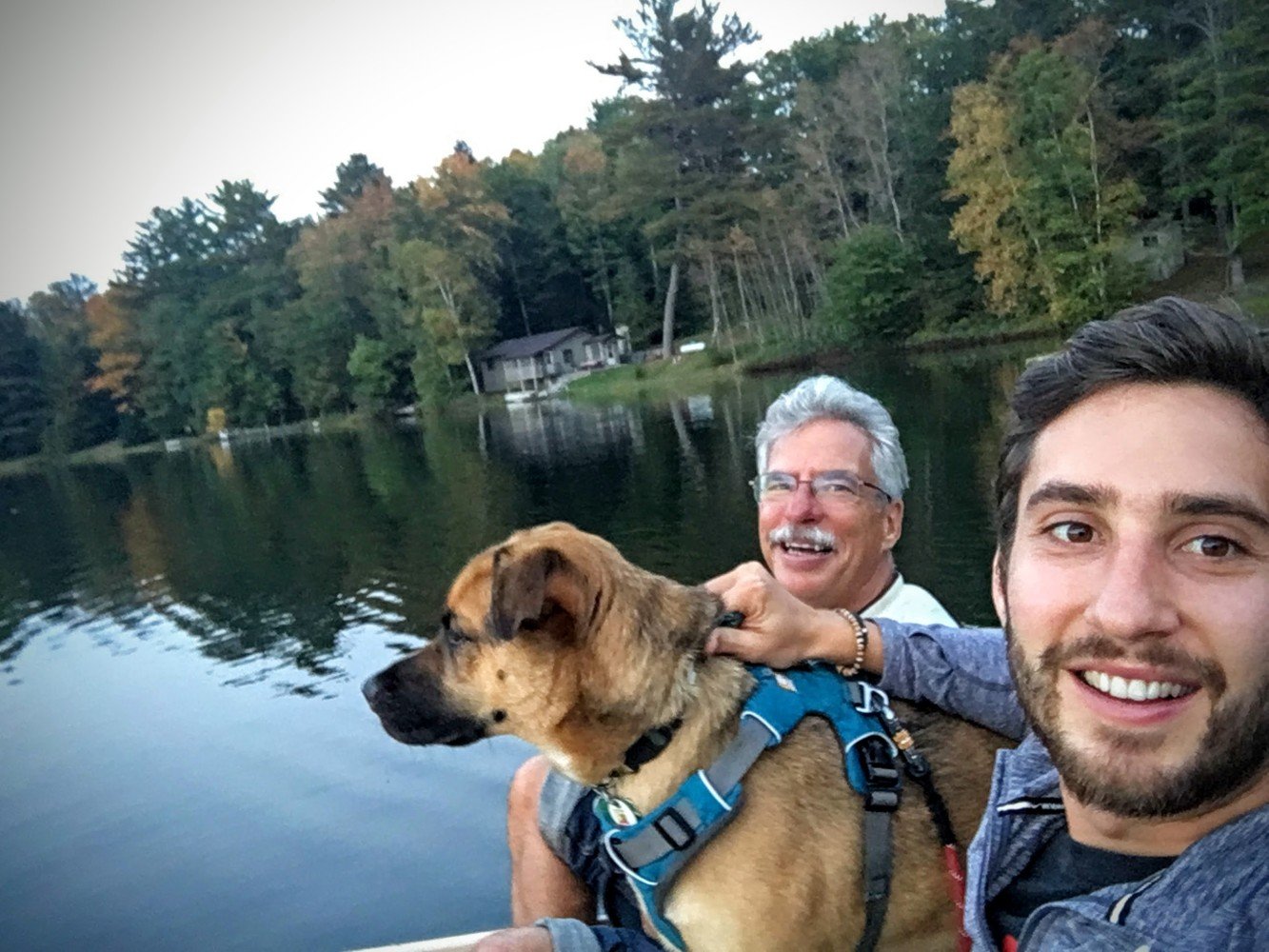Fighting for the Future of Our Great Lakes
By Ryan JefferyI’ve spent most of my life around lakes. I grew up in Madison on an isthmus between two incredible bodies of water. Every summer, my family would pile into our minivan and road-trip to Iowa, where we'd spend time with my grandparents at Lake Okoboji, swimming in one of only three blue-water lakes in the world—or so it’s claimed. One of my favorite trips in my early twenties was traversing the Great Lakes in an RV with my dad and my dog.
The trip around the Great Lakes with my dad and dog, Harvey
I now live in Chicago, and our proximity to Lake Michigan means our kids spend their summer days swimming on its beaches. I’m inexorably linked to lakes - the draw of the water always pulls me in. The Great Lakes even more so. Not just for their beauty, but for their tremendous power to help us overcome some of our biggest climate and environmental challenges.
Like much of the Midwest, though, the Great Lakes are often overlooked for this potential. Despite their vast capacity to address climate change, they are frequently overshadowed by more immediate risk zones and high-profile initiatives worldwide. This underestimation spans renewable energy development, water scarcity solutions, carbon sequestration efforts, and biodiversity conservation, among others.
Yet the Great Lakes are indispensable in our collective battle against climate change. Home to over 34 million people who depend on its vast resources, the basin harbors 5,500 cubic miles of freshwater, ranking as one of the largest reserves globally containing 95% of the U.S. surface water and 84% of North America's available surface freshwater. Beyond their quantifiable assets, the Great Lakes play a crucial role in moderating the region's climate, making them a linchpin for agricultural productivity in surrounding areas. This natural climate control is vital for the success of the agricultural industries that feed millions and drive local economies.
The region's economic impact is profound, supporting a $7 billion fisheries market and a $16 billion tourism industry. It's a biodiversity hotspot, home to more than 170 species of fish and over 3,500 species of plants and animals, thriving in an interconnected ecosystem of streams, lakes, wetlands, marshes, and forests. Furthermore, the Great Lakes have untapped potential in renewable energy development, with opportunities for wind, solar, and hydroelectric power that could further cement their role in a sustainable future.
By harnessing the Great Lakes' natural resources and ecological services, we can fortify our resilience against climate change while nurturing the economy and the environment. Their preservation and thoughtful management are crucial not only for maintaining biodiversity and water quality but also for exploring sustainable energy solutions that align with our climate goals. The Great Lakes are much more than just bodies of water; they are a foundation for regional stability, environmental sustainability, and economic prosperity. Quite simply, if we can protect our Great Lakes, we can protect our planet.
That’s why we are so excited about the hub of activity recently centered around the Great Lakes and the potential it has to make a significant impact in the area. The Great Lakes ReNEW initiative spearheaded by our friends at Current Water unlocks up to $160 million in funding to boost Great Lakes leadership on resource recovery and the circular economy.
And more recently, our announcement of the new Great Lakes Resilience Accelerator, with funding from the Department of Commerce and NOAA, adds support offered to startups working on cutting-edge technology that can help manage surface water risks in the Great Lakes region. This program, in collaboration with Current Water, Chain Reaction Innovation from Argonne National Labs, Mazarine Ventures, and a coalition of additonal regional partners we’re currently building, will provide non-dilutive funding to ~60 startups in the region over the next several years who can apply their technology in carbon sequestration, hazard mitigation, and ecosystem services to the Great Lakes region.
These combined new programs alone will bring millions of dollars of research, startup funding, ecosystem support, and coalition building to the region. Coupled with the vibrant ecosystem provided by local universities and corporations actively engaged in environmental research and sustainability efforts, the area is a burgeoning hotbed for innovation and collaboration in the fight against climate change.
The Great Lakes region stands at a unique intersection of climate impact and climate mitigation. Its vast resources and the recent surge in organizational support spotlight its role in our fight against climate change. As we harness the collective power of the region's natural assets, community initiatives, and technological advancements, the Great Lakes can serve as a beacon of hope and a model for sustainable action worldwide. This embodiment of a preserved and protected Great Lakes ecosystem, coupled with human ingenuity and commitment, can guide us toward a more resilient and better future.
Watching my kids play in Lake Michigan, I can't help but dream of a future where the beauty and health of these incredible bodies of water, and life, are not just preserved but enhanced. I strive to see a day when they will bring their own children to swim in these waters, free from the threats of harmful algal blooms, shoreline erosion, surface water pollution, disruptive invasive species, unpredictable water levels that jeopardize habitats, and the increased frequency of extreme weather events that threaten our shores and communities. These challenges currently mar our lakes' natural splendor. These are not mere aspirations but necessary actions to ensure that the Great Lakes can continue to be a source of joy, sustenance, and life for the millions who depend on them. This is more than a fight for environmental conservation; it's a fight for our families, for our children, and their children after them.
Please reach out to join us on the journey to #protect our Great Lakes.





